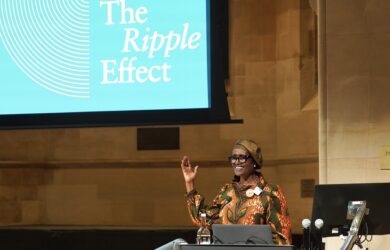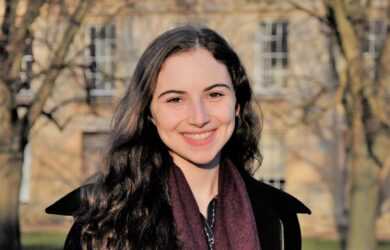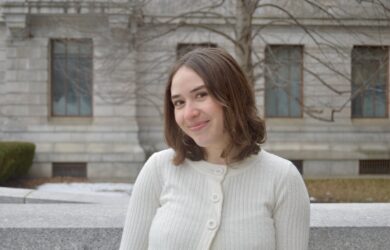Niraj, or Nij as he is known, practises what he preaches. Since arriving at the University of Cambridge on a Gates scholarship, he has been involved in a whole range of outreach work with children and adults, explaining the work he does researching solar cells and panels. He adds: “I think one of the biggest challenges of our generation is to understand the nature of climate change and develop ways to address it. If we don’t explain what we are doing we won’t bring the public along with us.”
Nij has been working with the University’s Community Affairs team on their Rising Stars public engagement programme. In January 2010 he took part in a public event to promote Rising Stars in which four researchers had to talk for a minute about their work to a 120-strong audience who knew nothing about their specialist field. The audience then voted on who they wanted to hear more from and Nij won.
He has worked with disadvantaged secondary school students from the Cambridge region on the science of the future through the Wysing Arts Centre and gave a lecture at an international summer school on “The Science of Electricity” last year. Through his interest in outreach work, Nij, who is studying for a PhD in Physics at the Nanophotonics Centre and is at Clare Hall, has also been working with the Naked Scientists, who run an award-winning radio show on the BBC. He is writing an article for them on electricity and plans to help with a show about solar cells in the near future.
Nij is no novice at public outreach work. In his home country of Australia he has worked with Scitech, the West Australian Government’s Science Outreach programme, taking shows about slime, bubbles and fun science out on the road to hundreds of schoolchildren, including those in remote aboriginal communities. “It was an incredible opportunity to see parts of Australia that you normally need permission to enter,” he says.
Nij was born in Hawaii where his father, an academic who specialises in the history of the Pacific, and his mother, a PhD student at the time, were based. At the age of seven, he moved to Canberra. At school, he was voted school captain and had to do quite a bit of public speaking. He was also a soccer referee as well as being in the cricket team.
He left to study politics, philosophy, maths and physics at the University of Melbourne and then transferred to a similar course at the Australian National University in Canberra in his second year. By the third year, he was keen to take a break: “I felt I was doing university because that was one of the done things to do. I wanted time to think about what was important,” he says.
He travelled across Australia and worked at various jobs – on fishing boats, at a cattle farm, as a bus driver and on a diving boat – and hitchhiked around the country. “After that I went back to university with a renewed interest in physics and maths,” he says, although he maintained his interest in politics through activism in the Australian Labour Party.
He graduated in 2007 after his honours year and at the end of his course applied to several universities, including Cambridge, to do his PhD. Cambridge had several advantages – firstly, that there were people working at the University on NanoPhotonics and solar panels, which was the area that interested him most. Another plus was that his father had spent six months doing research at the University and Nij had previously visited on a football tour so it was a place he had some knowledge of. He wanted to do his research on something which would have an impact on policy. “So much of physics is not very practical,” he says. His family has a big interest in environmental issues, with his mum being the first to become involved – she works at the International Union for Conservation of Nature. His sister, who is six years older than him, works in the Australian Government Department for the Environment conserving biodiversity in Western Australia.
After choosing Cambridge, Nij applied for an Overseas Research Studentship and a Cambridge Australia Trust Scholarship. He didn’t know what a Gates scholarship was, but ticked the box on the application form nevertheless.
He was first told that he had been accepted for an ORS and then later that he had got a Gates scholarship, with the award being based on his application form and references rather than an interview.
The year before he started at Cambridge, he travelled to Western Australia with his girlfriend, where he worked as a cycle messenger and for Scitech and surfed at Scarborough Beach. He deferred his arrival at Cambridge from October 2008 to January 2009 to travel with his girlfriend, who is now doing a masters course at Birmingham University.
His research at Cambridge is on nanovoid plasmonic enhanced low-cost photovoltaics – in layman’s terms he is focusing on making solar cells more efficient using really small structures. This will enable them to be cheaper as well as delivering more electricity for the same amount of sunlight. When he finishes his research, Nij is keen to travel with his girlfriend who plans to work as a youth ambassador in the Asia-Pacific region for a year. One organisation he is really interested in working with is Bushlight, which currently takes solar panels to remote aboriginal communities in Northern Australia in a practical, robust and culturally sensitive way.
After that Nij, who aside from playing football, judo and training for a triathlon also plays the didgeridoo, saxophone and piano, hopes to return to Australia to continue his research into solar cell physics.












